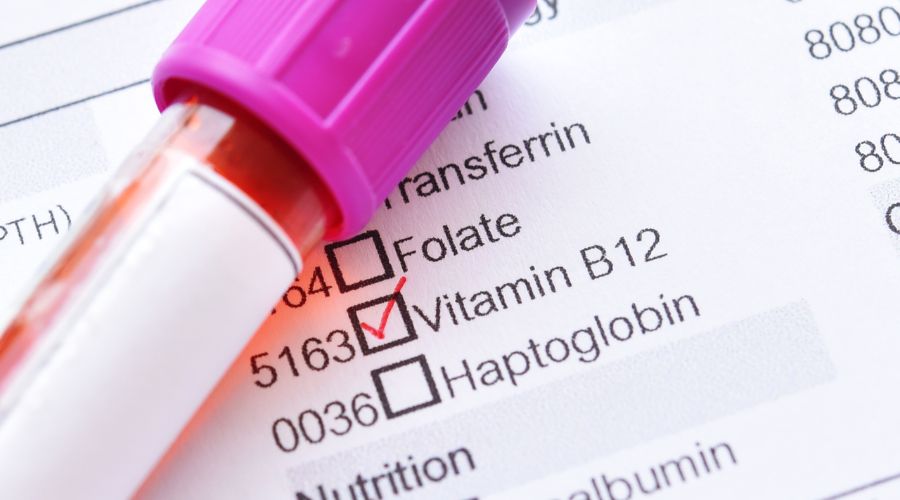Vitamin B12 is crucial for several bodily functions, and its deficiency can have a widespread impact on your health. Here’s a deeper look at how B12 affects various systems in your body:
1. Nerve Health and Cognitive Function
B12 is essential for maintaining the health of nerve cells, and it plays a significant role in the production of myelin, the protective covering around nerves. Without adequate B12, nerve function can deteriorate, leading to symptoms like numbness, tingling, and even permanent nerve damage. B12 also plays a role in cognitive health, and a deficiency has been linked to memory loss, confusion, and even cognitive decline, particularly in older adults.
2. Red Blood Cell Production
B12 is vital for the production of red blood cells in the bone marrow. A deficiency can lead to a condition called megaloblastic anemia, where red blood cells become larger than normal and are less effective in transporting oxygen throughout the body. This can cause fatigue, weakness, and pale skin.
3. DNA Synthesis
Vitamin B12 is necessary for the synthesis of DNA, the genetic material in all cells. Without it, cell division becomes disrupted, leading to impaired growth and development. This is particularly important in rapidly dividing cells, like those in the bone marrow and the digestive tract.
4. Mood Regulation
There is a link between low Vitamin B12 levels and mood disorders like depression and anxiety. B12 helps in the production of serotonin and other neurotransmitters that regulate mood. Low B12 levels can cause fatigue, irritability, and mood swings.
Who Should Get Tested for Vitamin B12 Deficiency?
While anyone can have low B12 levels, certain groups are more at risk and should consider regular testing:
- Older Adults: As we age, our body’s ability to absorb Vitamin B12 from food decreases. This makes older adults particularly susceptible to B12 deficiency.
- Pregnant or Breastfeeding Women: Vitamin B12 is essential for the development of a healthy fetus and infant. Pregnant and breastfeeding women who follow a vegetarian or vegan diet should monitor their B12 levels closely.
- Individuals with Digestive Disorders: Conditions like Crohn’s disease, celiac disease, or those who have had weight-loss surgery can impair B12 absorption, making supplementation necessary.
- Vegetarians and Vegans: Since Vitamin B12 is primarily found in animal products, those on plant-based diets may need to supplement B12, as it is found naturally only in animal-derived foods.
- People on Certain Medications: Some medications, including metformin (for diabetes) and proton pump inhibitors (for acid reflux), can interfere with B12 absorption, increasing the need for monitoring.
Symptoms of Vitamin B12 Deficiency
It’s essential to recognize the signs of B12 deficiency early on, as prolonged deficiency can lead to permanent damage. Some common symptoms include:
- Fatigue and Weakness: A feeling of extreme tiredness or lack of energy can be an early sign.
- Pale or Jaundiced Skin: A lack of B12 can lead to a pale complexion or even yellowing of the skin.
- Shortness of Breath and Dizziness: A low red blood cell count due to B12 deficiency can result in these symptoms.
- Cognitive Issues: Difficulty concentrating, memory problems, and even confusion or mood changes.
- Neurological Issues: Numbness, tingling in the hands or feet, and difficulty walking can occur if the deficiency is left untreated.
How Can You Prevent Vitamin B12 Deficiency?
The best way to prevent a B12 deficiency is through a balanced diet or supplementation:
-
Consume B12-Rich Foods: For non-vegetarians, eating meat, fish, poultry, eggs, and dairy can provide sufficient B12. For vegetarians or vegans, fortified foods like cereals, plant-based milk, and nutritional yeast are excellent sources.
-
B12 Supplements: If you’re at risk of deficiency or have been diagnosed with low B12 levels, taking B12 supplements (oral or sublingual) can help maintain adequate levels. Always consult with your healthcare provider before starting supplementation.
-
Regular Testing: If you’re at risk of deficiency, regular testing can help detect low B12 levels early and allow for timely intervention.
Conclusion
A Vitamin B12 test is a simple but effective way to ensure that your body is getting the essential nutrients it needs to function optimally. Given its importance in red blood cell production, nerve health, and cognitive function, it’s crucial to monitor your Vitamin B12 levels, especially if you’re in a high-risk group. Early detection and treatment can prevent long-term complications and improve overall well-being.
If you’re experiencing any symptoms of deficiency or fall into a high-risk category, consult your healthcare provider and consider getting a Vitamin B12 test. Proper nutrition and supplementation can help you maintain optimal health and energy levels.
